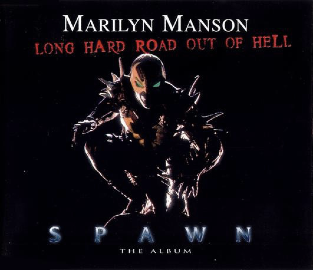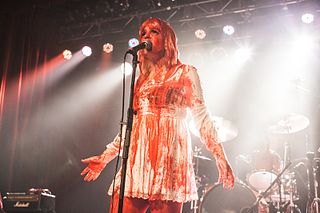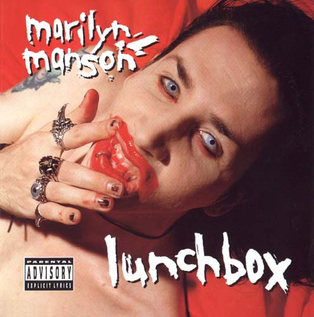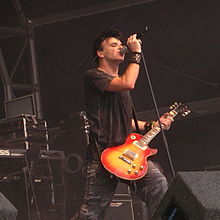
Marilyn Manson is an American rock band formed by namesake lead singer Marilyn Manson and guitarist Daisy Berkowitz in Fort Lauderdale, Florida, in 1989. Originally named Marilyn Manson & the Spooky Kids, they gained a local cult following in South Florida in the early 1990s with their theatrical live performances. In 1993, they were the first act signed to Trent Reznor's Nothing Records label. Until 1996, the name of each member was created by combining the first name of a female sex symbol and the last name of a serial killer, for example Marilyn Monroe and Charles Manson. Their lineup has changed between many of their album releases; the eponymous lead singer is the only remaining original member.

Portrait of an American Family is the debut studio album by American rock band Marilyn Manson. It was released on July 19, 1994 by Nothing and Interscope Records. The group was formed in 1989 by vocalist Marilyn Manson and guitarist Daisy Berkowitz, whose names were created by combining the given name of a pop culture icon with the surname of a serial killer: a naming convention which all other band members would conform to for the next seven years. The most prominent lineup of musicians during their formative years included keyboardist Madonna Wayne Gacy, bassist Gidget Gein and drummer Sara Lee Lucas.

Antichrist Superstar is the second studio album by American rock band Marilyn Manson. It was released on October 8, 1996, by Nothing and Interscope Records. It was recorded at Nothing Studios in New Orleans and produced by the band's eponymous vocalist along with Sean Beavan, former Skinny Puppy producer Dave Ogilvie and Trent Reznor of Nine Inch Nails. The recording of the album was marred by excessive drug use, which provoked a high level of antagonism between band members. Consequently, it was their last release to feature contributions from founding guitarist Daisy Berkowitz, who was acrimoniously fired partway through recording.

Smells Like Children is the first EP by American rock band Marilyn Manson. It was released on October 24, 1995, by Nothing and Interscope Records. Produced by Trent Reznor of Nine Inch Nails, it represents an era of the band full of drugs, abuses, tours, sound experiments, and references to the Child Catcher, a villain from the 1968 musical film Chitty Chitty Bang Bang.

Lest We Forget: The Best Of is the first greatest hits album by American rock band Marilyn Manson. It was released on September 28, 2004, by Interscope Records. The album was conceived by the band's eponymous vocalist as a "farewell compilation", and was originally going to feature a duet with Shirley Manson of Garbage. Upon its completion, neither singer was satisfied with the duet, and it remains unreleased. Instead, the band recorded a cover of Depeche Mode's "Personal Jesus" (1989), which became the only new track on the album and was released as a single. The deluxe version of the album included a bonus DVD containing sixteen music videos, one of which was the previously unreleased uncensored version of the music video for "Saint" (2004).

Bradley Mark Stewart, known by his stage name Gidget Gein, was an American musician and artist. He was the second bassist and co-founder of the rock band Marilyn Manson. His stage name is a combination of fictional character Gidget and serial killer Ed Gein.

2000 Years of Human Error is the fourth studio album by the American rock band Godhead. It was released on January 23, 2001 by Posthuman Records, making this one of Posthuman's only releases. The album contains select songs that have been re-recorded by the band, which previously appeared on 1998's Power Tool Stigmata. "Sinking" has since been re-recorded for the subsequent release Unplugged. The version of "Penetrate" featured on this album was also featured on the soundtrack to the 2002 movie Queen of the Damned.

Frederick Streithorst Jr., better known by his stage name Sara Lee Lucas, is an American musician and the original drummer for Marilyn Manson. He has also performed as "S.L. Lucas" or simply "Lucas". His stage name is derived from serial killer Henry Lee Lucas and baked goods company Sara Lee. After leaving Marilyn Manson in 1995, he performed in many other industrial bands using tribal style of drumming and experimental digital percussion. He also became active with his mastering company, Masterlab.

Lunch Boxes & Choklit Cows is a compilation album of previously unreleased demo tracks recorded in the early 1990s by rock band Marilyn Manson. Original guitarist Scott Putesky obtained the rights to these and 11 other recordings in a lawsuit against Brian Warner, and announced that this release is the first in a planned series of Spooky Kids CDs. Some are from demos and others have never been previously released. These are digitally remastered and Putesky says they sound better than the original cassettes because of it.

"Tourniquet" is song by American rock band Marilyn Manson. It was released as the second major-label single from their second studio album Antichrist Superstar. The image this song conveys is that of the main character in a world of sorrow and self-pity, prior to his transformation into the Little Horn. It was written by frontman Marilyn Manson, co-founder Daisy Berkowitz and longtime bassist and guitarist Twiggy Ramirez. Like many other songs from Antichrist Superstar, the song's lyrics are based on a dream Manson had.

"Get Your Gunn" is a song by American rock band Marilyn Manson. It was released as the lead single from their debut studio album, Portrait of an American Family (1994). The song was written by the band's eponymous vocalist along with original guitarist and bassist Daisy Berkowitz and Gidget Gein, respectively, and was produced by Manson with Trent Reznor. "Get Your Gunn" was inspired by the murder of abortionist David Gunn by an anti-abortion activist, an event which angered Manson. The song also took influence from Manson's lifelong fascination with abortion and an interaction he had with an anti-abortion protester.

"Rock Is Dead" is a song by American rock band Marilyn Manson. It was released as the third single from their third studio album, Mechanical Animals (1998). It was written by the band's eponymous frontman, along with bassist Twiggy Ramirez and keyboardist Madonna Wayne Gacy, and was produced by Manson, Michael Beinhorn and Sean Beavan. A glam rock and heavy metal track with elements of electronic music and grunge, the song features electric and bass guitars, keyboards, and live drums in its instrumentation. The song was featured on the soundtrack of the Wachowskis' film The Matrix (1999).

"Dope Hat" is a song by American rock band Marilyn Manson. It was released as the promotional single from their debut album, Portrait of an American Family. It was first recorded for a demo tape released in 1992, entitled The Family Jams.

"Long Hard Road Out of Hell" is a song by American rock band Marilyn Manson and British trip hop band Sneaker Pimps. It was released as a single from the soundtrack to the 1997 motion picture Spawn. An arena rock and gothic rock song, "Long Hard Road Out of Hell" was written by Marilyn Manson and Twiggy Ramirez and produced by Manson and Sean Beavan. Its lyrics are about self-loathing and its title is derived from John Milton's Paradise Lost (1667). After the track was written, the Sneaker Pimps' Kelli Ali was recruited to perform background vocals on it, as the Spawn soundtrack featured collaborations between hard rock artists and electronic music artists. The Sneaker Pimps were dissatisfied with the final track and wanted a remix of it to be released as a single instead; conversely, Manson deemed it a personal favorite.

Scott Mitchell Putesky, also known as Daisy Berkowitz, was an American musician, songwriter, composer, visual artist, and record producer. He was the co-founder of the rock band Marilyn Manson & the Spooky Kids , and was the guitarist for the band until 1996. After leaving Marilyn Manson, Putesky was involved in a number of other projects such as Three ton Gate, The Linda Blairs, Jack Off Jill, Stuck on Evil, Kill Miss Pretty, and The Daisy Kids.

Jack Off Jill was an American alternative rock band from Fort Lauderdale, Florida, founded in 1992 by vocalist Jessicka, drummer Tenni Ah-Cha-Cha, bassist/keyboardist Agent Moulder, and guitarist Michelle Inhell. Though these four women were the initial founders, nine members rotated through the group in its life-span, including Scott Putesky, guitarist and co-founder of Marilyn Manson. The band lasted nine years, with only Jessicka and Moulder remaining throughout the initial run. The band reunited in 2015 for a number of shows, which consisted of Jessicka, Tenni, Inhell, and bassist Helen Storer.
"Apple of Sodom" is a song by American rock band Marilyn Manson. The track was recorded for the soundtrack to David Lynch's 1997 film Lost Highway. It was written by the band's eponymous vocalist and produced by Manson with Sean Beavan. Lynch personally chose the band to contribute music to the soundtrack as he found Manson inspiring, and because of the band's commercial viability. An industrial song about obsession, "Apple of Sodom" was named after the eponymous fruit, and was inspired by Manson's feelings about singer Fiona Apple. The song was followed by multiple collaborations between Manson and Lynch.
!PAUS3, or THEE PAUSE, is an international platinum selling musician and artist, who began his career in his early teens in the former Soviet Bloc nations of Ukraine, Romania and Bulgaria.

The Manson Family Album is the first studio recording by American rock band Marilyn Manson and a precursor to their debut studio album, 1994's Portrait of an American Family. It was produced by Roli Mosimann and is composed of original takes and mixes of songs which were later found on their debut album. However, the band and its eponymous vocalist were unhappy with Mosimann's production, claiming it to be poorly representative of their established sound and calling it too "smoothed and polished". The majority of songs on The Manson Family Album were later re-recorded or remixed by Nine Inch Nails personnel Trent Reznor, Sean Beaven and Alan Moulder at the Record Plant in Los Angeles. The album's title is a double entendre; it also relates to the commune of cult leader Charles Manson.




















